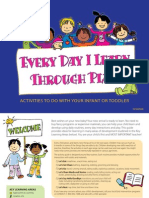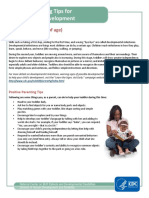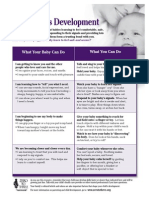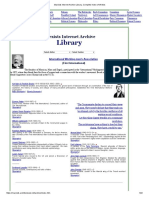Positive Parenting Tips For Healthy Child Development: Infants (0-1 Year of Age)
Positive Parenting Tips For Healthy Child Development: Infants (0-1 Year of Age)
Uploaded by
Romeo ChrissCopyright:
Available Formats
Positive Parenting Tips For Healthy Child Development: Infants (0-1 Year of Age)
Positive Parenting Tips For Healthy Child Development: Infants (0-1 Year of Age)
Uploaded by
Romeo ChrissOriginal Description:
Original Title
Copyright
Available Formats
Share this document
Did you find this document useful?
Is this content inappropriate?
Copyright:
Available Formats
Positive Parenting Tips For Healthy Child Development: Infants (0-1 Year of Age)
Positive Parenting Tips For Healthy Child Development: Infants (0-1 Year of Age)
Uploaded by
Romeo ChrissCopyright:
Available Formats
Positive Parenting Tips for
Healthy Child Development
Infants (0-1 year of age)
Developmental Milestones
Skills such as taking a first step, smiling for the first time, and waving "bye-bye" are called developmental milestones.
Developmental milestones are things most children can do by a certain age. Children reach milestones in how they play,
learn, speak, behave, and move (like crawling, walking, or jumping).
In the first year, babies learn to focus their vision, reach out, explore, and learn about the things that are around them.
Cognitive, or brain development means the learning process of memory, language, thinking, and reasoning.Learning
language is more than making sounds ("babble"), or saying "ma-ma" and "da-da". Listening, understanding, and knowing
the names of people and things are all a part of language development. During this stage, babies also are developing
bonds of love and trust with their parents and others as part of social and emotional development. The way parents
cuddle, hold, and play with their baby will set the basis for how they will interact with them and others.
For more details on developmental milestones, warning signs of possible developmental delays, and information on how
to help your child’s development, visit the "Learn the Signs. Act Early." campaign website.
http://www.cdc.gov/ncbddd/actearly/index.html
Positive Parenting Tips
Following are some things you, as a parent, can do to help your baby during this time:
Talk to your baby. She will find your voice calming.
Answer when your baby makes sounds by repeating the sounds and
adding words. This will help him learn to use language.
Read to your baby. This will help her develop and understand
language and sounds.
Sing to your baby and play music. This will help your baby develop a
love for music and will help his brain development.
Praise your baby and give her lots of loving attention.
Spend time cuddling and holding your baby. This will help him feel
cared for and secure.
Play with your baby when she’s alert and relaxed. Watch your baby
closely for signs of being tired or fussy so that she can take a break
from playing.
Distract your baby with toys and move him to safe areas when he
starts moving and touching things that he shouldn’t touch.
Take care of yourself physically, mentally, and emotionally.
Parenting can be hard work! It is easier to enjoy your new baby and
be a positive, loving parent when you are feeling good yourself.
National Center on Birth Defects and Developmental Disabilities
Division of Human Development and Disability
Child Safety First
When a baby becomes part of your family, it is time to make sure that your home is a safe place. Look around your
home for things that could be dangerous to your baby. As a parent, it is your job to ensure that you create a safe home
for your baby. It also is important that you take the necessary steps to make sure that you are mentally and emotionally
ready for your new baby. Here are a few tips to keep your baby safe:
Do not shake your baby―ever! Babies have very weak neck muscles that are not yet able to support their
heads. If you shake your baby, you can damage his brain or even cause his death.
Make sure you always put your baby to sleep on her back to prevent sudden infant death syndrome (commonly
known as SIDS).
Protect your baby and family from secondhand smoke. Do not allow anyone to smoke in your home.
Place your baby in a rear-facing car seat in the back seat while he is riding in a car. This is recommended by the
National Highway Traffic Safety Administration.
Prevent your baby from choking by cutting her food into small bites. Also, don’t let her play with small toys and
other things that might be easy for her to swallow.
Don’t allow your baby to play with anything that might cover her face.
Never carry hot liquids or foods near your baby or while holding him.
Vaccines (shots) are important to protect your child’s health and safety. Because children can get serious
diseases, it is important that your child get the right shots at the right time. Talk with your child’s doctor to make
sure that your child is up-to-date on her vaccinations.
Healthy Bodies
Breast milk meets all your baby’s needs for about the first 6 months of life. Between 6 and 12 months of age,
your baby will learn about new tastes and textures with healthy solid food, but breast milk should still be an
important source of nutrition.
Feed your baby slowly and patiently, encourage your baby to try new tastes but without force, and watch
closely to see if he’s still hungry.
Breastfeeding is the natural way to feed your baby, but it can be challenging. If you need help, you can call the
National Breastfeeding Helpline at 800-994-9662 or get help on-line at
http://www.womenshealth.gov/breastfeeding. You can also call your local WIC Program to see if you qualify for
breastfeeding support by health professionals as well as peer counselors. Or go to http://gotwww.net/ilca to
find an International Board-Certified Lactation Consultant in your community.
Keep your baby active. She might not be able to run and play like the "big kids" just yet, but there’s lots she can
do to keep her little arms and legs moving throughout the day. Getting down on the floor to move helps your
baby become strong, learn, and explore.
Try not to keep your baby in swings, strollers, bouncer seats, and exercise saucers for too long.
Limit screen time to a minimum. For children younger than 2 years of age, the American Academy of Pediatrics
(AAP) recommends that it’s best if babies do not watch any screen media.
A pdf of this document for reprinting is available free of charge from
http://www.cdc.gov/ncbddd/childdevelopment/positiveparenting/infants.html
Additional Information:
http://www.cdc.gov/childdevelopment
1-800-CDC-INFO (800-232-4636) http://www.cdc.gov/info
You might also like
- What Is Child DevelopmentDocument9 pagesWhat Is Child DevelopmentNoreza Ali100% (1)
- Distress Among Infants and Toddlers: Crying As A Sign of Distress in InfantsDocument34 pagesDistress Among Infants and Toddlers: Crying As A Sign of Distress in InfantsRolando Carlos FloresNo ratings yet
- FORM 2B - Word FormatDocument6 pagesFORM 2B - Word FormatKannan Muthusamy100% (1)
- Perkembangan Dan Perawatan BayiDocument3 pagesPerkembangan Dan Perawatan BayiSiti RubiahNo ratings yet
- Infants (0-1 Year of Age) : Developmental MilestonesDocument2 pagesInfants (0-1 Year of Age) : Developmental MilestonesJoanne TolopiaNo ratings yet
- Parenting GuideDocument22 pagesParenting GuideMaryjane Pascua BoneoNo ratings yet
- Milestone MomentsDocument60 pagesMilestone MomentsFiorellaBeatriz100% (1)
- FULL-LIST-CDC LTSAE-Checklists2021 Eng FNL2 508Document24 pagesFULL-LIST-CDC LTSAE-Checklists2021 Eng FNL2 508mariam villalbaNo ratings yet
- The Ultimate Baby Milestone Checklist Are You Missing AnythingFrom EverandThe Ultimate Baby Milestone Checklist Are You Missing AnythingNo ratings yet
- How To Take Care of Your BabyDocument3 pagesHow To Take Care of Your BabyJay DeshpandeNo ratings yet
- Developmental Surveillance HandbookDocument26 pagesDevelopmental Surveillance HandbookCaroline SanjeevNo ratings yet
- From Cradle to Preschool: What to Expect & What to DoFrom EverandFrom Cradle to Preschool: What to Expect & What to DoNo ratings yet
- From Cradle to Preschool – What to Expect & What to Do: Help Your Child's Development with Learning Activities, Encouraging Practices & Fun GamesFrom EverandFrom Cradle to Preschool – What to Expect & What to Do: Help Your Child's Development with Learning Activities, Encouraging Practices & Fun GamesNo ratings yet
- Sensory Strategies For Toddlers and Pre Schoolers 2Document14 pagesSensory Strategies For Toddlers and Pre Schoolers 2Amin KhanNo ratings yet
- Everyday I Learn Through Play PDFDocument24 pagesEveryday I Learn Through Play PDFSangini24No ratings yet
- Positive Parenting Tips For Healthy Child Development: Toddlers (1-2 Years of Age)Document2 pagesPositive Parenting Tips For Healthy Child Development: Toddlers (1-2 Years of Age)Romeo ChrissNo ratings yet
- Baby SensesDocument2 pagesBaby SensesCamille LiqueNo ratings yet
- Infancy N ToddlerhoodDocument4 pagesInfancy N Toddlerhoodapi-287029828No ratings yet
- Responding To Your Child'S Needs and BehaviorsDocument10 pagesResponding To Your Child'S Needs and Behaviorsapi-279105354No ratings yet
- Your Child @: 12 To 18 MonthsDocument2 pagesYour Child @: 12 To 18 MonthsjegankvpNo ratings yet
- How To Talk With Your BabyDocument24 pagesHow To Talk With Your Babyn44brwgxn4No ratings yet
- Stimulating Your Little One's Mind: Everything you need to help your newborn discover the worldFrom EverandStimulating Your Little One's Mind: Everything you need to help your newborn discover the worldRating: 3 out of 5 stars3/5 (1)
- ECHO Parents Tip 2 - Setting Your Child Up For SuccessDocument2 pagesECHO Parents Tip 2 - Setting Your Child Up For SuccessconstantinenerissaNo ratings yet
- First Time Parents: How to Raise Healthy & Happy Children Through Love, Care, & TrainingFrom EverandFirst Time Parents: How to Raise Healthy & Happy Children Through Love, Care, & TrainingNo ratings yet
- Preschool Child AdoptionDocument12 pagesPreschool Child AdoptionArdeleanu Anca - MariaNo ratings yet
- Helping Children With AutismDocument8 pagesHelping Children With AutismAINUL HIDAYAH BINTI MOHD KAMAL IPG-PelajarNo ratings yet
- A Complete Guide for New Parents: Positive parenting, Skills, Discipline Techniques for Gentle Parenting & Holistic ParentingFrom EverandA Complete Guide for New Parents: Positive parenting, Skills, Discipline Techniques for Gentle Parenting & Holistic ParentingRating: 4 out of 5 stars4/5 (1)
- News Bulletin: Did You Know? October Is Sudden Infant Death Syndrome (SIDS) Awareness MonthDocument4 pagesNews Bulletin: Did You Know? October Is Sudden Infant Death Syndrome (SIDS) Awareness Monthmbockstruck30No ratings yet
- Child Health and Development - DocxtoddlerDocument7 pagesChild Health and Development - DocxtoddlerEncep Hendra PermanaNo ratings yet
- Crying HandoutDocument2 pagesCrying Handoutapi-235065651No ratings yet
- Focus on Babies: How-tos and What-to-dos when Caring for InfantsFrom EverandFocus on Babies: How-tos and What-to-dos when Caring for InfantsNo ratings yet
- Infant Toddler Socio Emo Dev NewDocument7 pagesInfant Toddler Socio Emo Dev NewDaryll Jim AngelNo ratings yet
- Universida Nacional de Chimborazo Languages School Methodology 2Document3 pagesUniversida Nacional de Chimborazo Languages School Methodology 2Elsa PintaNo ratings yet
- Fear of Strangers: Babies and Young ChildrenDocument1 pageFear of Strangers: Babies and Young ChildrenPutri Dwi AnnisaNo ratings yet
- The Complete New Parents Guide to Caring for Their Baby: Everything you Need to Know About Caring for your Newborn BabyFrom EverandThe Complete New Parents Guide to Caring for Their Baby: Everything you Need to Know About Caring for your Newborn BabyNo ratings yet
- ToddlerDocument60 pagesToddlerNasir AunaNo ratings yet
- 21PEC Head To Toes-FinalDocument28 pages21PEC Head To Toes-FinalAlexandru PetrescuNo ratings yet
- New Parents Tips & Guide: How to Care for, Raise, Train, & Teach, your Newborn Baby Boy or GirlFrom EverandNew Parents Tips & Guide: How to Care for, Raise, Train, & Teach, your Newborn Baby Boy or GirlNo ratings yet
- Baby Milestones- How to Stay Calm During the Developmental Roller CoasterFrom EverandBaby Milestones- How to Stay Calm During the Developmental Roller CoasterNo ratings yet
- Policies and Procedures Handboo1Document12 pagesPolicies and Procedures Handboo1api-253149793No ratings yet
- Meeting The Needs ofDocument20 pagesMeeting The Needs ofcassandra2744No ratings yet
- Volunteer Handbook & Orientation 09Document5 pagesVolunteer Handbook & Orientation 09kzoodropinNo ratings yet
- Beaget ScienceDocument2 pagesBeaget ScienceMark Dave AurelioNo ratings yet
- Tips To Promote Social-Emotional Health Among Young ChildrenDocument4 pagesTips To Promote Social-Emotional Health Among Young Childrenvivek_sharma13No ratings yet
- IDICA Activity 3 Growth and DevelopmentDocument4 pagesIDICA Activity 3 Growth and DevelopmentRaymund IdicaNo ratings yet
- Matthew: The Family History of Jesus The MessiahDocument45 pagesMatthew: The Family History of Jesus The MessiahRomeo ChrissNo ratings yet
- Newstudy Centre List With Email IDsDocument3 pagesNewstudy Centre List With Email IDsRomeo ChrissNo ratings yet
- The Purpose of FailureDocument39 pagesThe Purpose of FailureRomeo ChrissNo ratings yet
- Stress Affects TeenagersDocument1 pageStress Affects TeenagersRomeo ChrissNo ratings yet
- Objectives of Teaching EVS at Primary Level PDFDocument76 pagesObjectives of Teaching EVS at Primary Level PDFRomeo Chriss100% (4)
- Positive Parenting Tips For Healthy Child Development: Toddlers (1-2 Years of Age)Document2 pagesPositive Parenting Tips For Healthy Child Development: Toddlers (1-2 Years of Age)Romeo ChrissNo ratings yet
- Making The Most of Dynamics 365 Iur: Partner'S Guide ToDocument4 pagesMaking The Most of Dynamics 365 Iur: Partner'S Guide ToKevin KohNo ratings yet
- Marxists Internet Archive Library, Complete Index of WritersDocument22 pagesMarxists Internet Archive Library, Complete Index of WritersRodri RojasNo ratings yet
- Deferred AnnuityDocument22 pagesDeferred AnnuityCaitlin TishNo ratings yet
- Five Terms You MUST Be Familiar With SCADA, DCS, PLC, RTU and Smart Instrument EEPDocument1 pageFive Terms You MUST Be Familiar With SCADA, DCS, PLC, RTU and Smart Instrument EEPwahbaabassNo ratings yet
- OTTERSDocument6 pagesOTTERSMiguel LleraNo ratings yet
- English Proficiency Test (EPT) Reviewer With Answers - Part 1Document4 pagesEnglish Proficiency Test (EPT) Reviewer With Answers - Part 1Robinson costanNo ratings yet
- Women RepresentationDocument7 pagesWomen RepresentationIsha khobragadeNo ratings yet
- First Conditional - Negative SentencesDocument1 pageFirst Conditional - Negative SentencesLunaNo ratings yet
- Multi Time Frame (MTF) AnalysisDocument2 pagesMulti Time Frame (MTF) AnalysisFrom Shark To Whale50% (2)
- Marex OS II-Optimized For REINTJES Trolling Gearboxes With v-ADSDocument4 pagesMarex OS II-Optimized For REINTJES Trolling Gearboxes With v-ADSMohammed Saber100% (1)
- Novas Midias AntropologiaDocument288 pagesNovas Midias AntropologiaPedro Portella MacedoNo ratings yet
- It Controls Part Ii: Security and Access Operating System: InterpretersDocument13 pagesIt Controls Part Ii: Security and Access Operating System: InterpretersVillena Divina VictoriaNo ratings yet
- People v. BardajeDocument30 pagesPeople v. BardajeerikagcvNo ratings yet
- Nurul Syamima: Info EducaDocument1 pageNurul Syamima: Info EducaAtiqah MisranNo ratings yet
- Pitching A Business Plan PDFDocument9 pagesPitching A Business Plan PDFBCom HonsNo ratings yet
- Topic Proposal FinalDocument2 pagesTopic Proposal Finalapi-272918687No ratings yet
- Anatomical TerminologyDocument5 pagesAnatomical TerminologySamantha SlominNo ratings yet
- Rudiments: Tone Color, Texture and Forms Group 3Document12 pagesRudiments: Tone Color, Texture and Forms Group 3Jheviline LeopandoNo ratings yet
- Digital Architecture in PakistanDocument24 pagesDigital Architecture in PakistanMuhammad TayyabNo ratings yet
- Garage in A BoxDocument24 pagesGarage in A BoxJohn SmithNo ratings yet
- Chapter 3 Early Education in Calamba and BinanDocument23 pagesChapter 3 Early Education in Calamba and BinanRhoniel Gerome RomeroNo ratings yet
- Business Ethics Report XDocument152 pagesBusiness Ethics Report XDwayne PanganNo ratings yet
- Teldat Dm569-I M1 M1L InstallationDocument32 pagesTeldat Dm569-I M1 M1L Installationdaniel.g.pboxNo ratings yet
- Introduction To EmailDocument20 pagesIntroduction To EmailCarlo BibalNo ratings yet
- Multi-Factor Authentication: A SurveyDocument31 pagesMulti-Factor Authentication: A SurveyAndrewNo ratings yet
- RavPower RP WD02 Filehub Windows ManualDocument13 pagesRavPower RP WD02 Filehub Windows ManualJudson BorgesNo ratings yet
- Lord I Stretch FULLDocument8 pagesLord I Stretch FULLαγαπημένη του ΧριστούNo ratings yet
- The Extractive Industries and Society: Original ArticleDocument9 pagesThe Extractive Industries and Society: Original ArticlehenryNo ratings yet
- 260 TJ - Operator S ManualDocument148 pages260 TJ - Operator S ManualDiego Salazar JarrínNo ratings yet






























































































